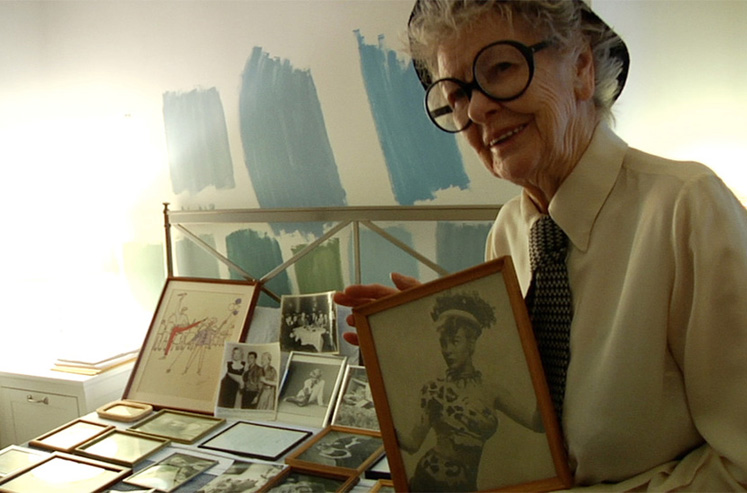The most transparent scene in Chiemi Karasawa’s documentary Elaine Stritch: Shoot Me comes towards the final third of the film. The documentary’s subject, stage legend Elaine Stritch, is in her suite at the Carlisle Hotel on New York’s Upper East Side. She’s unpacking a container of English muffins (which happen to be her late husband’s family’s brand) and then disappears around a corner. A moment later, her head pops back into the shot and she barks at the camera. “You need to follow me,” she yells at the filmmakers. This is her daily routine, she explains. It’s important to capture that for the film. Then she asks the filmmakers if they’d like her to do the scene again. They agree, and Elaine takes out a large butcher knife and begins to stab holes in the English muffin package. Before she can turn for the door again, the camera cuts. We don’t follow her out; we already know all we need to about Elaine Stritch and her daily routines. The star is always performing.
As the title of the new film suggests, Elaine Stritch: Shoot Me is an invitation. It’s a film about a star who wants to be front and center, and who tries to keep hold of the spotlight in the twilight of her life. It follows the Emmy and Tony Award-winning Stritch through her attempt to mount a swan song, a traveling revue of songs by Stephen Sondheim, with whom she worked closely during her long and storied career. Performing at her age is a struggle, and along the way she fights alcoholism, depression, exhaustion, diabetes, a fading memory, and her own awareness of impending death. In fact, the show brings such hardship on Stritch that it almost makes the title feel like an acerbic, moribund joke. The show might kill her; that might be the point. Shoot Me suggests Stritch is determined to go out on her own terms.
The most electric moments of the documentary occur during the stage show, when, after struggling through rehearsals – forgetting her lines, losing her confidence, storming off stage – she pulls it together for the performance with a mix of humor, improv, self-deprecating humor, and the sheer brilliance of her performing power. In these scenes we begin to get a glimpse of what it means to be a performer, to be inhabited by an almost super human instinct to connect with an audience, to bring stage and auditorium under one’s control. She feeds off the stage, she needs the stage, and to retire would be to welcome a kind of death.
Like 2010’s Joan Rivers: A Piece of Work, Elaine Stricht: Shoot Me attempts to register the fallout of this strange co-dependence between the performer and performing. Like Rivers, Stritch is obsessive, a perfectionist, but she is also warm, candid and vulnerable. She welcomes the cameras into her bedroom, tells stories about turning down a proposition from John F. Kennedy, and seems lays herself bare for the documentary. And yet, Strcht’s candidness also feels like a final performance. Her magnanimity draws us in, she offers us intimacy, and yet her powers to do so still feel like aspects of her performing instinct. What happens when the pretending stops, she wonders aloud at one point. It feels like less a question aimed at her career than a consideration of the substance of her life. Age, illness, death – the suffering these things bring – they threaten to make her into someone she has never been, someone not pretending, a person whose identity is not caught up in the ambiguous authentic inauthenticity that is to live a life performing fiction. This is the tension that simmers just beneath the surface of Stritch appearance in the film. And at each moment when the stage seems to slip from her grasp, she rages back.
Dylan Thomas wrote, “Old age should burn and rave at close of day,” but perhaps Betty Davis, whom Stritch invokes in the film, said it best. “Old age is not for sissies.”






